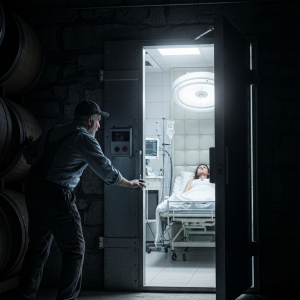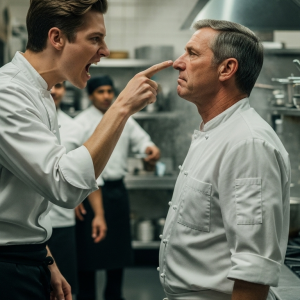The grand Sterling house felt cavernously empty. Every room, every polished surface, every shadow held the echo of David’s absence. For Sarah, his widow, grief was a physical weight, a constant pressure on her chest. She moved through the halls like a ghost in her own home, clutching one of David’s old, worn sweaters, the last faint scent of him her only comfort.
She had met David in a small, independent bookstore where she worked. He was the heir to the Sterling fortune, and she was a literature student. His family had never approved. To them, she was a nobody, a pleasant but ultimately insignificant footnote in their son’s life. His mother, Margaret, a woman whose posture was as rigid as her social views, treated Sarah with a chilling, polite disdain. David’s older brother, Richard, saw her as a gold-digger, an outsider who had somehow bewitched his sibling.
David had been her shield against their snobbery. He had loved her fiercely, protectively. In his final weeks, as a cruel illness wasted his body but never his spirit, he had tried to reassure her. One night, holding her hand, his voice a reedy whisper, he had made her a promise.
“Don’t you worry about them, my love,” he’d said, his eyes still bright with intelligence. “I’ve taken care of everything. I’ve made sure you will always be safe, no matter what. I promise you that.” Sarah, her vision blurred with tears, had assumed it was just a dying man’s loving reassurance. She had no idea it was the primer for a war he had already won on her behalf.
The day after David’s funeral was a gray, merciless Tuesday. The house was still filled with the cloying scent of sympathy lilies, their white petals a stark contrast to the ugliness that was about to unfold. Sarah was in the living room, staring blankly at a photograph of her and David on their wedding day, when the doorbell rang.
It was Margaret and Richard. They weren’t dressed in mourning clothes. They were dressed for business. And they weren’t empty-handed. Richard carried a toolbox, and behind them, a locksmith waited on the porch. Margaret, for her part, held a stack of flattened cardboard boxes.
She strode into the foyer, her heels clicking like gunshots on the marble floor. She threw the stack of boxes down at Sarah’s feet. They landed with a dry, slapping sound.
“You have one hour,” Margaret said, her voice as cold and hard as a tombstone. “This is a Sterling family home. With David gone, your claim to it is gone, too. You were a brief, unfortunate chapter in this family’s history, my dear. That chapter is now closed.”
Richard avoided Sarah’s gaze, walking past her to let the locksmith in. “We’re changing the locks,” he said, a tremor of what might have been shame, or perhaps just greedy excitement, in his voice. “Standard procedure.”
Sarah stood frozen, the shock so profound it was paralyzing. They were evicting her from the home she had shared with her husband, while his funeral flowers were still fresh in their vases. They were changing the locks, metaphorically and literally locking her out of the life she had built.
“Pack your personal effects and be gone,” Margaret commanded, her final words delivered with the casual cruelty of a queen ordering an execution. “You are nothing to us now.”
Numb with grief and a dawning, terrifying sense of betrayal, Sarah didn’t fight. What was the point? The house, without David, was just a collection of rooms. She packed a single suitcase with her clothes, David’s sweater, and the wedding photograph. She walked out of the front door just as the locksmith was installing a new deadbolt, the metallic rasp of the screwdriver a final, grating farewell.
She found refuge at the small apartment of her best friend, Amy, who was righteously furious on her behalf. But Sarah felt nothing but a vast, hollow emptiness. She was a widow, homeless, and utterly alone, abandoned by the only family she had left.
The next morning, as she was numbly sipping a cup of coffee, her phone rang. It was an unknown number. She let it go to voicemail, but the caller was persistent. On the third try, she answered.
“Mrs. Sarah Sterling?” a man’s voice asked, formal and clipped. “This is Arthur Harrison, the Sterling family’s legal counsel. I must insist on an urgent meeting at my office this afternoon. Two p.m. It is a matter of the utmost importance regarding the reading of your late husband’s last will and testament.”
A sliver of dread shot through her. They were probably going to formalize her destitution, to read a document that legally erased her from David’s life. But she had to go. She had to see it through to the bitter end. When she arrived at the lavish, wood-paneled law office, Margaret and Richard were already there, sitting in plush leather chairs. They looked smug, triumphant, like hunters waiting to collect their trophy.
Mr. Harrison, an older gentleman with kind eyes that seemed to hold a hint of sorrowful knowledge, began the meeting. He spoke of David’s foresight and his meticulous planning. He explained that the will was structured in a rather… unconventional way.
“The primary will,” he began, looking at Margaret and Richard, “is fairly straightforward. In the event of his passing, the majority of the Sterling assets—the estate, the corporate shares, the investment portfolios—are to remain within the Sterling family bloodline, to be managed by the two of you.”
A satisfied smile spread across Margaret’s face. Richard puffed out his chest. This was it. The final victory.
Mr. Harrison then turned his full attention to Sarah. “However, this primary will was contingent upon a single, binding addendum. A mandate, if you will, left by my client.”
He cleared his throat, opening a file. “David was very specific about this. He stipulated that his first and greatest priority was your continued well-being and happiness, Sarah. Therefore, the validity of the first will is predicated entirely upon the answer to one question, which I am legally required to ask you now, with a notary present to witness your response.”
The air in the room grew thick. Margaret and Richard stared at Sarah, their eyes narrowed with suspicion. What was this?
Mr. Harrison looked directly at Sarah, his expression serious. “Mrs. Sterling, please answer with a simple ‘yes’ or ‘no.’ In the thirty days following your husband’s passing, have you, in all matters, been treated with kindness, dignity, and respect by the Sterling family?”
Silence. Sarah’s heart hammered in her chest. She looked at the two predators sitting across from her. She thought of the cardboard boxes thrown at her feet. She thought of the locksmith. She thought of the love and protection David had promised her. This was his final act of love. This was her moment to honor it.
Her voice was barely a whisper, but in the silent room, it was a thunderclap. “No.”
Mr. Harrison nodded slowly, a grave expression on his face. “Thank you, Mrs. Sterling. Your answer has been notarized.” He closed the first file folder with a soft, final thud.
“Then, as per my client’s immutable instructions,” he announced to the stunned room, “the primary will is now null and void.”
He reached into his desk and retrieved a second, thicker envelope, this one sealed with dark red wax bearing the Sterling family crest. “And this, the secondary and final will, takes immediate and irrevocable effect.”
Margaret was on her feet. “This is an outrage! What is the meaning of this?”
Mr. Harrison broke the seal with a letter opener. He unfolded the document and began to read in a clear, resonant voice. “I, David Sterling, in the event my family has failed to honor my wife, Sarah Sterling, do hereby bequeath my entire estate, without exception—all properties, shares, liquid assets, and holdings—to The David and Sarah Sterling Foundation for Arts and Sciences.”
Richard let out a choked sound, a cross between a laugh and a sob. They had lost the inheritance to a charity.
But Mr. Harrison wasn’t finished. He read the final, devastating sentence.
“And as of the moment this addendum is executed, the newly appointed, sole, and lifetime President of the Foundation, vested with full and absolute control over all its assets and decisions, is my beloved wife, Sarah Sterling.”
The destruction was instantaneous and absolute. In the space of a single breath, the world had been turned upside down. Margaret and Richard Sterling were no longer the powerful heirs of a financial dynasty. They were destitute. The single word “No” from the woman they had despised and discarded had just stripped them of everything they had ever known.
Margaret’s face, a moment before flushed with victory, was now a ghastly, mottled white. “This is insane!” she shrieked, her voice losing its aristocratic control and becoming a raw, desperate screech. “She manipulated him! He was sick! He wasn’t in his right mind! We will contest this!”
Mr. Harrison looked at her over the rim of his spectacles, his expression unmoved. “I’m afraid not, Margaret. Your son was in perfect mental health when he drafted this will a year ago, a fact attested to by two independent psychiatric evaluations which he insisted upon. He knew you. He knew what you would do.”
He turned to both of them, the instrument of David’s final, perfect justice. “He created a test of your character, and you failed it spectacularly. The will is ironclad. Your own greed was the trigger. There is no legal recourse. You have disinherited yourselves.”
Richard stared into the abyss of his own future, a future of paying rent and working for a living. His entire life, built on the certainty of this inheritance, had just been vaporized. All for what? To kick a grieving woman out of a house that was now, ironically, owned by a foundation she controlled. The sheer, exquisite totality of their self-sabotage was too much to comprehend.
Sarah walked out of that law office into the bright afternoon sun, not as a homeless widow, but as the steward of one of the largest philanthropic foundations in the state. The shock was overwhelming, but underneath it was a profound, aching love for the brilliant, wonderful man who had protected her even from beyond the grave. He hadn’t just left her money; he had left her a mission. He had left her his legacy.
She did not seek revenge. That would have been a betrayal of the man David was. She moved back into the house, her house now, and had the Sterling family’s remaining personal items packed and sent to them at their new, much smaller, rented apartment.
Then, she went to work. With Mr. Harrison’s guidance, she took the helm of The David and Sarah Sterling Foundation. She poured the vast resources into the things David had been passionate about: funding scholarships for underprivileged students, building new wings on hospitals, commissioning public art, and endowing libraries.
A year later, Sarah stood at a podium, bathed in the warm light of a setting sun. She was speaking at the dedication of the new “David Sterling Memorial Children’s Library,” the foundation’s first major project. Her voice was strong, her purpose clear.
“My husband believed that the greatest wealth is not what you accumulate, but what you give away,” she told the assembled crowd. “He believed that kindness is the only true currency. Through this foundation, his legacy of kindness will continue to grow, to build, to heal.”
She had turned the deepest pain of her life into a force for good. She had not only honored his promise to keep her safe; she had become the guardian of his soul, amplifying his love out into a world that desperately needed it. She was living proof of his final, unwritten will: that in the end, love is the only inheritance that truly matters.




